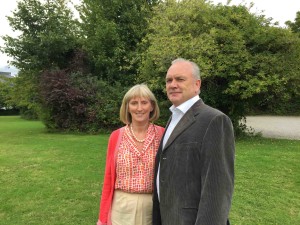Happy ever after?
Why do each of you believe that this amalgamation should go ahead?
Noreen O’Sullivan: “Well firstly, we’ll have one voice for pubs and secondly we’ll be able to reposition the pub in terms of food and drink, which we didn’t all have before.
Oliver Hughes: “Also, lots of the VFI’s and LVA’s work has become irrelevant due to the Monopolies Commission preventing our negotiating with suppliers any more. That’s become illegal now.
“But the cosy place the pub once had in Irish society is no longer there and so we need a strong voice to represent us both.”
In what ways are you ‘stronger together’?
Oliver Hughes: “At present there’s lots of duplication but while we might not be exactly on the same page, we’d now be speaking with one voice.
In what ways could you make the lobbying more effective as one organisation?
Oliver Hughes: To date we’ve not spent any money on lobbying but now we’ll be able to run a media campaign involving advertising and we’ll have a budget of around €500,000 per annum for this which was never the case before.
What were the differences between the two organisations as highlighted by the Genesis report?
Oliver Hughes: The only thing it highlighted was the similarity of our problems! This amalgamation is all about representing the publicans.
If you had to name one disadvantage to amalgamation, what would it be?
Noreen O’Sullivan: The only one I can think of is that people are afraid of the unknown. That won’t be so once they know what this is all about.
Oliver Hughes: We, too, are aware of those fears so we must put work into ensuring that those fears don’t become a reality. One such Dublin fear is that we’ll lose our intimacy in becoming part of a larger organisation, but nothing will have changed for Dublin publicans – we’ll still have our meetings, same as before.
What are the ‘common cost constraints’ that both Dublin and rural publicans must deal with?
Noreen O’Sullivan: All the red tape involved in doing business, the rates, the insurance, all the problems that you have which face all small businesses – the pub is no exception, whether in the country or in Dublin….
Oliver Hughes: … For example the 22 licences you need to run a pub here”.
How would the new body be different from the present arrangement? How would it affect the Councils of both organisations?
Noreen O’Sullivan: The new Council would be smaller, more cost-effective and more efficient. Every county will have a representative on the new body….
Oliver Hughes: … It’d be a nimble, more efficient Council…
What strategy would it adopt in regard to Government as one body that it could not adopt when two?
Oliver Hughes: There are differences but they’re not necessarily between Dublin and country. It could be food and non-food, music and non-music. Now we will at least be on-message and able to sort them out ourselves…
Noreen O’Sullivan: … One single unified organisation all about the pub.
What would be the structure and governance of the new body?
Noreen O’Sullivan: Each county will have one representative (or more depending on the size of the county) on the Council. It will be a smaller Council of 45 (the VFI has 65 on its NEC at present) so it’ll be smaller and more efficient and from this we’ll elect a Board of Management consisting of nine people: three from Dublin and six from the other counties and an additional two to be picked by the Board’s independent Chairperson so that all the regions will be represented.
The new board should be up and elected by our May AGM. The new organisation’s President will be elected for a one-year term and of course we’ll be looking for a new Chief Executive from the present two Chief Executives.
What additional activities would it be involved in?
Noreen O’Sullivan: It’s also going to have a business toolbox to deal with any issues that publicans have. This will provide expert advice to enable us make progress in repositioning the pub in terms of food and drink.
Would it still be important to differentiate between rural pubs and those in Dublin?
Oliver Hughes: Oh, that’s too broad-a brush stroke there! A high turnover pub in the centre of Galway has a huge amount in common with a city centre pub in Temple Bar. Equally, a pub in Dublin can have the same problems as a rural pub in Tipperary. In that sense, the LVA has ‘country’ pubs all the way from Bray to Balbriggan.
It’s not about Dublin versus the rest of country, it’s about the problems and challenges our pubs have in common.
Financing/staffing of new body versus present arrangement?
Noreen O’Sullivan: The new association will be a company limited by guarantee. The new company will be staffed by both organisations who’ll transfer over to the new company. Inevitably there will be redundancies and retirements as there will be only one Chief Executive. There will be restructuring of the Head Office here in Angelsea Road.
The two remaining properties – VFI Headquarters in Rathfarnham and an LVA rented-out apartment in Donnybrook – will be sold.
Financing will be from subscriptions and all cash from both associations will be channelled into the new company.
Oliver Hughes: Both organisations are financially secure and will incur no debt as a result of this amalgamation. Subscription fees will also be frozen where they are at present for two years and then charged based on turnover.
Could the same self-interest not split this amalgamated association just as it did when Dublin left the national organisation in the 70s?
Noreen O’Sullivan: No, we need to reposition the pub and to have a stronger organisation in 2015. Both organisations wanted this and it will involve a whole new level of representation.
Oliver Hughes: The final decision on this will be voted on by the LVA in late September and by the VFI in October.

“The final decision on this will be voted on by the LVA in late September and by the VFI in October.”








